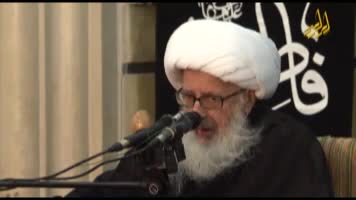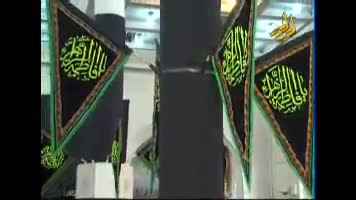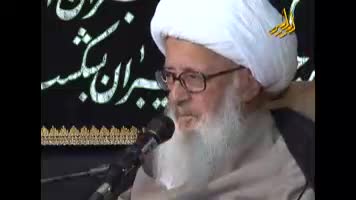We haven't done anything,
Nevertheless, you should either thank your fathers or your mothers,
or you must have had a good past record to your credit that allowed you to attain this opportunity (an opportunity to service Hazrat Zahra (A.S.).
In the name of Allah, the Most Beneficent, the Most Merciful.
That which was said (about me) … However, I am not but faults and shortcomings.
We haven't done anything,
Nevertheless, you should either thank your fathers or your mothers,
or you must have had a good past record to your credit that allowed you to attain this opportunity (an opportunity to service Hazrat Zahra (A.S.).
In between the words (of the earlier speaker) it was said:
"They (the present group) are the castellans and servants of Hazrat Zahra (A.S.)",
these are awe-inspiring words.
Qutb-ud-din Rawandi, a great scholar, jurist and one of the earliest narrators of Hadith,
has narrated this following tradition:
"After the martyrdom of Hazrat Zahra (A.S.), Um-e-Ayman swore
to forsake Medina and went off to live in the wilderness".
What was the (matter)? What happened? Who was (Hazrat Zahra)?
She (Um-e-Ayman) knew (the answers to these questions). She said, "I swear" and pledged to forsake Medina.
(She) went off into the desert. There, in the Arabian wilderness, she was struck by thirst, (to the point) that it threatened her life.
She said just one sentence. She said:
"O' Lord, I am the servant of Fatima (A.S.)".
The moment she uttered this sentence: "I am dying of thirst!",
a bucket full of nectar flowed down from the heavens, from which she drank her full.
This is very important, the explanation of these words is long-drawn out.
She drank such a nectar, that after drinking it her body no longer needed any food or drink for another seven years.
What does this mean?
She said but one word: "I am the servant of Fatima (A.S.)",
service, when truly acknowledged, is such.
Her words were answer by this rapturous delight.
Where was that water from? No one knows.
It changed the very constitution of her material body (and) It neutralized all natural prinicples.
Service to her (Hazrat Zahra) is an elixir that transforms all base metals (into gold).
A name is a sign given to the holder of that name.
Our names are worldly ones.
Some names are heavenly,
however that which astonishes all minds is this:
"For Fatima (A.S.) there are nine names",
but these nine names are neither worldly, nor heavenly.
A person whose name is such, (one wonders) what must she herself be?
What are these names?
There is no position imaginable, higher than the position of divine proximity.
Proximity to the All-Exalted, All-Powerful One.
There is no heaven above that.
The celestial throne, the seat of divine power, the tablet and the pen of destiny, all pale in significance.
(This is) the position of divine proximity.
The tradition is this: "Fatima bears nine names (granted to her) from (the position) of God's proximity".
If her names are from (the position of) God's proximity, then what must she herself be?
Sheikh-ul-Mohaditheen Sadooq narrates that Jabir asked this question of the sixth imam:
"Why was Fatima Zahra (A.S.) named Zahra?"
Why was Fatima linked to the word Zahra?
We have Hadeeth, and we have the Fiqh of Hadeeth. We have traditions, and we have the contextual study of these traditions.
The tradition itself is one discussion, its contextual study is a completely different discussion.
Hadith is one discussion, whereas the fiqh of hadeeth is a completely different discussion.
The indications, subtleties and realities that exist within the words of the Ahl-e-Bait (A.S.)
are not understandable for everyone.
It was asked: Why was she named Zahra? The answer lies within this tradition.
I will summarize this answer - a complete explanation would require a book -
It is said: The secret behind the title "Zahra"…
The Imam's statement with regards to the title "Zahra" is something to this effect
(She) was created from the luminance of God's glory, … from the luminance of glory.
The source of the said radiance is this:
When God created her from the luminance of His glory,
her radiance illuminated the heavens and the earth.
(Her) inner self is such an inner self. (Her) soul and essence is from the luminance of glory.
and then it radiates…
The parameter of this radiance… - and this is truly strange -
The parameter of the sun's radiance, with all its greatness, is no larger than the solar system.
Each one of these suns has a defined parameter of radiance.
But what a sun she was,
the parameter of her radiance showered down light upon all the heavens and the earths.
Angels, about whom Amir-ul-Momineen (A.S.) says:
"From amongst the angels, whom You granted residence within your heavens,
and raised them up from Your earth,
they are the most knowledgable of Your creations with regards to You",
When the radiance (in question revealed itself), even such great angels fell down in prostration.
They said: O' God, what is this radiance?
The answer was astonishing.
This radiance is such that "I created it from My Glory".
This was the source of her creation.
After this, He said, "I send forth this radiance" by way of a prophet from amongst my prophets. (A prophet) whom
I have raised up, in excellence, above all other prophets.
The source of her creation is the luminance of His glory,
then (after being created) she attains the position of proximity to the All-Exalted and All-Powerful.
After being sent down into the temporal world, the vessel that houses her existance is the body of the most excellent of God's prophet (P.B.U.H.).
All these facets hold within themselves precise intricacies.
The vessel of her existance must be the body of the most excellent of God's prophet (P.B.U.H.),
any other thing would simply be impossible.
(And) who, then, is her equal?
(He) who, if it were not for him, Adam and the rest of humanity would have failed in providing her with a match.
That which is important lies in this statement:
"This is a radiance that I shall place within his (the Prophet's) body,
and from it I shall create all of My vicegerents.
Vicegerents who, after the end of My revelations,
shall each be God's deputy within the realm of possibility.
The Hasani forebearance, the Husayni bravery,
the Sajadi worship, the Baqiri achievements,
the Jafari grand-works, the Kazimi sciences,
the Razavi irrefutable arguments, the Taqawi generosity,
the Naqawi purity, the Askari awe,
the divine occultation, these are all derivations of this radiance.
This is the secret that has made Fatima into Zahra.
This jewel was such a jewel, it could not have been named otherwise.
One word suffices the listener who comprehends. That word is this:
Who was Amir-ul-Momineen (A.S.)? Who was Ali ibn Abitalib (A.S.)?
(Ali ibn Abitalib) was he about whom Jibraeel cried out, in between the heavens and the earth, saying:
"There is no young and energetic man except Ali"
One strike by his hand…,
One strike, about which there exists a consensus in amongst all knowledgable people,
One strike by his sword is "greater than the worship of all of creation".
This was the man who, during the night of migration, slept in the Prophet's bed and left the heavens in astonishment.
"And among men is he who sells himself to seek the pleasure of Allah" (Al-Baqara:207)
In the battle of Uhad, he acted in a manner that amazed all the divine prophets and messengers.
He body had become littered with holes and wounds (during this battle).
Whenever they tried to put heal one of his wounds, they would place a wick on one end,
and it would slip out from the other.
The Prophet (P.B.U.H.) wept profusely, but he smiled and said:
"O' Prophet of God, have I pleased God?"
Such a man stands next to her body and says: "May Ali have died (before witnessing this event)"
My soul made to endure Zahra's separation, is imprisoned
I wish my wailing would release it from its imprisonment.
He understood what a jewel she was.
How she lived? How she left this worldly abode?
Truly, the mind is flabbergasted.
This is the matter (in question)… ,
pay great attention to it, (so that you) comprehend what a position you have been granted.
Act in a way that your name is not crossed out (of this hallowed list).
The great scholars have all narrated this matter:
The Prophet (P.B.U.H.) entered (Fatima's house), and say the state of his daughter's life,
the mantle she wore was made of camel's fur,
with one hand she worked the hand mill,
with at the same time she suckled (her infant son) Syed-us-Shohada (A.S.).
The moment the Prophet (P.B.U.H.) say this sight, "his eyes became inundated with tears".
The Seal (of the prophets) is the very heart of the universe.
When his emotional state changes (and he experiences sorrow), the heavens and the earth also change with him.
What situation did he witness that his eyes became full of tears?
When (Hazrat Fatima) say the tears in her father's eyes,
she said a sentence that not only astonishes me and you, but even Jibraeel himself.
Her reaction in front of the Prophet (P.B.U.H.) was this:
"O' Prophet of God - All praise be to Allah for His bounties,
and All thanks be to Allah for His blessings".
Bounties on one side, blessings on the other. Praise for one, and thanks for the other.
(Then) Jibraeel descended and said: "O' Prophet of God, God says:
"And soon will your Lord give you so that you shall be well pleased" (Ad-Dhuhaa:05)
This is when this verse was revealed.
In summary, "we shall give you so much that you shall become well-pleased"
What shall He give henceforth? Its beyond mention.
When the start was this, what shall the end be?
The end is this - just one sentence suffices -
The first person to set foot open the realm of God's proximity is Fatima Zahra (A.S.)
She is the first, preceeding even the Seal of the prophets (P.B.U.H.) in this matter.
First she shall enter (into that realm), and only then shall her father enter therein.
This matter astonishes the mind of every thinker.
It is important that this matter is narrated not only by the shi'a but by all muslim scholars.
"The first to enter paradise is Fatima (A.S.)"
(and) what will happen then?
(Everyone) who enters (paradise) so as to reside therein.
"Adam and all the other prophets shall visit her as pilgrims".
The first program with paradise is this: 124 thousand prophets shall come to visit her as pilgrims.
Now, how did such a person spend the days of her life?
How did she bade farewell to this world? What is our responsibility?
Your reward is with her.
How did God reward the servant of this woman (while she was dying of thrist) trapped in that desolate wilderness?
Is it possible that your service be forgotten within His court?
Act is a way so that tomorrow you are not struck by regret.
If one lamentation group fails to come out onto the streets on the third (of Jamadi-uth-Thani),
the remorse they will face will be irreparable.
(That remorse shall be this) that I could have
helped in healing the wounds of Zainab-e-Kubra, by I failed to do so!
By way of beating my chest and crying out "Ya Zahra", I could have given my condolences to the Master of the Age (A.S.) but I did not !
Do not lose this opportunity !
Be careful ! Not even one lamentation group within this country should be left behind.
"And warn them of the day of intense regret, when the matter shall have been decided" (Maryam:39)
We said this so that tomorrow no one complains.
Do you know what effect these lamentation groups create?
Lamentation groups that come out onto the streets, beating their chests and heads, all this is not recorded in one register.
It is recorded in God's own register,
First in His book, in His protected tablet, because (all this effort) was for the sake of His blessed servant Fatima Zahra.
Second, (it is recorded) in the register of the Seal of the prophets (P.B.U.H.),
(this is) because all (your) lamentation becomes an ointment that heals the wounded heart of the Seal of the prophets (P.B.U.H.).
"Say: I do not ask of you any reward for it but love for my near relatives" (Ash-Shura:23)
(Then) it is recorded in the register of Amir-ul-Momineen (A.S.),
(and) in the register of Hasan ibn Ali (A.S.),
(and) in the register of Shaheed-us-Shuhada (A.S.), who ran bare-foot, that night, behind the funeral (of his mother).
When you go to the tomb of the eighth Imam, he shall look upon you in a different manner,
(he shall see) that you are the same as the one who toiled restlessly for the sake of his wounded mother.
Act in a manner that (the mourning that takes place) this year be different from that of every other year, by the will of God.
and this year, try to do so in every city.
One martyrdom eve, apart from other groups, the group of the Saadat (the Prophet's descendents) should come out especially.
And non-syeds should not enter into the lamentation group of these Saadat.
The non-syeds should follow behind them.
This group of Saadat should come out in all countries, cities and villages.
For what? For the fact that this night is the night of her burial,
In that night, her body was placed under the earth.
On the side of her funeral, Amir-ul-Momineen (A.S.) found a letter.
In that letter, it was written: "To my children …
"Send my salutations to my children up until Judgement day".
On that martyrdom eve, this salutation must be answered.
O Allah, be, for Your representative, the Hujjat (proof), son of AlHasan, Your blessings be on him and his forefathers, in this hour and in every hour, a guardian, a protector, a leader, a helper, a proof, and an eye. until You make him live on the earth, in obedience (to You), and cause him to live in it for a long time.



